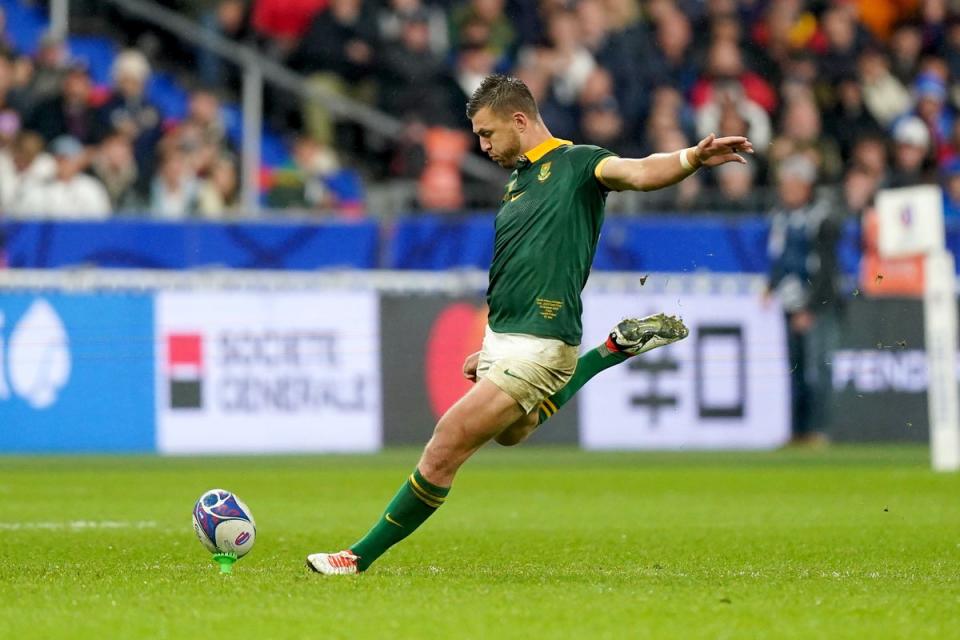Springboks take huge gamble on biggest stage of all

If fortune does indeed favour the brave, then South Africa should triumph in the Rugby World Cup final on Saturday evening. For the third time in two months, they have opted for the controversial 7-1 split of forwards to backs on their bench and, in the process, have taken a huge gamble in the biggest game on the calendar.
For the uninitiated, rugby teams almost always opt for a 5-3 or 6-2 split among their replacements. The laws of the international game dictate that you must have three front-row specialists (hookers and props, who count among the forwards) on your bench, and then teams will usually have a roughly even division of forwards and backs for the remaining five slots to ensure adequate cover for all position.
Yet for the third time in the last two months, the Springboks have boldly opted for just one lone back – Willie Le Roux in this instance – among their subs. On the previous two occasions, there has been no damage done. The final World Cup warm-up match saw them hand New Zealand a record 35-7 defeat at Twickenham and although they lost a hard-fought pool match to Ireland, the bench split had no negative impact on the result.
Given that Saturday evening in Paris is a rematch against the All Blacks, perhaps there is sound logic in reprising the successful formation from late August. That was certainly the argument of head coach Jacques Nienaber, who downplayed the controversy when explaining the selection at the team announcement press conference on Thursday.
“The team is not 15, it is 23,” insisted Nienaber. “We always say that. When you do squad selection there are a lot of things that influence that from medical to past performances and a lot of analysis into New Zealand and where we think we can get the edge on them.
“Then the discussions starts between the coaches and it goes from a 5-3 to a 6-2 to a 7-1, then it goes back again. It is not a 10-minute discussion, it is hours and hours.
“I’m not going to say what the strengths and weaknesses of the All Blacks are, that would be stupid. But a lot of analysis went into it and at the end we went with a squad of 23. It could have been 6-2, 5-3, it doesn’t matter. You select a team that you think can get a result. The 23 we selected for a reason, and the reason is we think they can deliver and win us a back-to-back World Cup.”

While the decision has worked in the past, there is undoubtedly an element of playing with fire from the Springboks. Le Roux is a world-class full back and can comfortably play on the wing, while a backline reshuffle with the available players could solve any issues at fly half or centre.
But starting No 9 Faf de Klerk is the only scrum half in the squad and any sort of injury to the man with the flowing blond hair could leave South Africa in a bind. Nienaber again played down the issue and highlighted Cheslin Kolbe’s similar role in sevens as a solution to that hypothetical.
“As coaches you always mitigate risk by prepping other people,” said Nienaber. “In our case it will be Cheslin. He played sweeper in sevens which is the equivalent to scrum half. He has always been a guy who, if we got a yellow card, would be the stand in half-back, not just this week but for a couple of weeks.”
De Klerk also highlighted replacement flanker Kwagga Smith – another man with sevens experience – as a solution but any sort of extended period with Kolbe or Smith at No 9 feels like a World Cup-losing recipe.
The other main notable call in the Springbok team selection was Handre Pollard getting the nod over Manie Libbok at fly half. Given Libbok’s early substitution during the semi-final after struggling to execute the kicking game – and similarly rainy weather expected at the Stade de France on Saturday evening – the choice of Pollard, who led his side to victory off the bench, is not a huge surprise, although Libbok is unlucky to miss out on the matchday 23 entirely.

The ability to bring an almost entirely new pack off the bench – their patented ‘bomb squad’ – in a World Cup final certainly plays into the Springboks rugby philosophy of physicality and domination up front. It couldn’t turn the tide against Ireland in the pool stage but it is the boldest of calls befitting the grandest of stages.
No one said you win a World Cup by being timid and sometimes in sport, fortune does favour the brave.
South Africa XV to face the All Blacks in Rugby World Cup final: 15. Damian Willemse, 14. Kurt-Lee Arendse, 13. Jesse Kriel, 12. Damian de Allende, 11. Cheslin Kolbe, 10. Handre Pollard, 9. Faf de Klerk; 1. Steven Kitshoff, 2. Bongi Mbonambi, 3. Frans Malherbe, 4. Eben Etzebeth, 5. Franco Mostert, 6. Siya Kolisi (captain), 7. Pieter-Steph du Toit, 8. Duane Vermeulen.
Replacements: 16. Deon Fourie, 17. Ox Nche, 18. Trevor Nyakane, 19. Jean Kleyn, 20. RG Snyman, 21. Kwagga Smith, 22. Jasper Wiese, 23. Willie Le Roux

